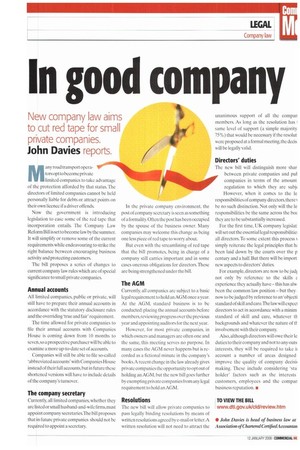n good company
Page 41

If you've noticed an error in this article please click here to report it so we can fix it.
New company law aims to cut red tape for small private companies.
John Davies reports.
Many road transport opera tors opt to become private limited companies to take advantage of the protection afforded by that status. The directors of limited companies cannot be held personally liable for debts or attract points on their own licence if a driver offends.
Now the government is introducing legislation to ease some of the red tape that incorporation entails. The Company Law Reform Bill is set to become law by the summer. It will simplify or remove some of the current requirements while endeavouring to strike the right balance between encouraging business activity and protecting customers.
The bill proposes a series of changes to current company law rules which are of special significance to small private companies Annual accounts All limited companies, public or private, will still have to prepare their annual accounts in accordance with the statutory disclosure rules and the overridinglrue and fair' requirement.
The time allowed for private companies to file their annual accounts with Companies House is coming down from 10 months to seven,so a prospective purchaser will be able to examine a more up-to-date set of accounts.
Companies will still be able to file so-called 'abbreviated accounts' with Companies House instead of their full accounts, but in future these shortened versions will have to include details of the company's turnover.
The company secretary Currently, all limited companies, whether they are listed or small husband-and-wife firms,must appoint company secretaries.The bill proposes that in future private companies should not be required to appoint a secretary. In the private company environment, the post of company secretary is seen as something of a formality. Often the post has been occupied by the spouse of the business owner. Many companies may welcome this change as being one less piece of red tape to worry about, But even with the streamlining of red tape that the bill promotes, being in charge of a company still carries important and in some cases onerous obligations for directors. These are being strengthened under the bill.
The AGM Currently, all companies are subject to a basic legal requirement to hold anAGM once a year. At the AGM, standard business is to be conducted: placing the annual accounts before members, reviewing progress over the previous year and appointing auditors for the next year.
However, for most private companies, in which owners and managers are often one and the same, this meeting serves no purpose. In many cases the AGM never happens but is recorded as a fictional minute in the company's hooks. A recent change in the law already gives private companies the opportunity to opt out of holding an AGM. but the new bill goes further by exempting private companies from any legal requirement to hold an AGM.
Resolutions The new bill will allow private companies to pass legally binding resolutions by means of written resolutions agreed by e-mail or letter.A written resolution will not need to attract the unanimous support of all the compan members. As long as the resolution has 1 same level of support (a simple majority 75%) that would be necessary if the resolut: were proposed at a formal meeting, the decis will be legally valid.
Directors' duties The new bill will distinguish more shar between private companies and put companies in terms of the amount regulation to which they are subji However, when it comes to the le responsibilities of company directors, there be no such distinction. Not only will the le responsibilities be the same across the boa they are to be substantially increased.
For the first time. UK company legislati will set out the essential legal responsibilitie; all directors. To some extent this process simply reiterate the legal principles that lu been laid down by the courts over the p century and a half. But there will be import, new aspects to directors' duties.
For example, directors are now to be judi not only by reference to the skills a experience they actually have— this has alw, been the common law position — but they now to be judged by reference to an 'objecti standard of skill and care.The law will expeci directors to act in accordance with a minim standard of skill and care, whatever th backgrounds and whatever the nature of d7 involvement with their company.
Also, although directors will owe their le duties to their company and not to any outs interests, they will be required to take ii account a number of areas designed improve the quality of company decisii making. These include considering 'stal holder' factors such as the interests customers, employees and the compan business reputation.
TO VIEW THE BILL www.dti.gov.uldcld/review.htm
























































































































































































